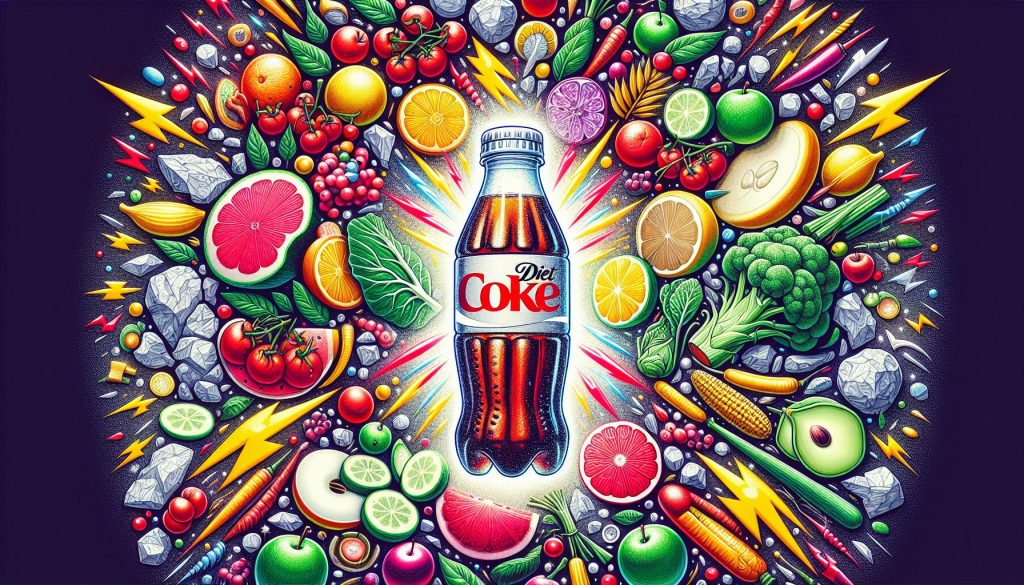
The Energy Game: Decoding the Diet Coke Revival
Why does the seemingly innocuous Diet Coke give so many of us a sudden surge of energy? A simple, straightforward answer points to the caffeine content found in this popular soft drink. Nevertheless, there’s more to this potent potion than meets the eye. Our quest to uncover the energy-boosting secrets of Diet Coke will explore such aspects as caffeine content, artificial sweeteners, and the effects these have on our bodies.
The Kick-Start Effects of Caffeine
Sipping a chilled glass of Diet Coke to break free from the mid-afternoon daze—that’s a moment familiar to many. Diet Coke’s crowd-pulling charm, indeed, lies in the caffeine content. Providing an instant wakeup call, caffeine triggers your brain, shaking off the sluggishness to prime you for action.
Caffeine: A Double-edged Sword
While caffeine is an undeniable energy booster, it’s important to remember that its effects are short-lived. When the caffeine high wears off, it can leave you feeling more exhausted than when you began, creating a vicious cycle of energy highs and lows.
A Spoonful of Sweetness
What’s the fuss about the artificial sweeteners in Diet Coke? For starters, Diet Coke employs a combination of artificial sweeteners like aspartame and acesulfame potassium. These confer the sweet taste that makes the beverage a delight without piling on the calories.
Sweetness Sans Sugar
Believe it or not, even though these sweeteners are calorie-free, they still impact your body’s response to food. When your taste receptors detect sweetness, they expect a sugar rush and prepare the body accordingly. This can sometimes lead to an energy boost, albeit an artificial one.
Unveiling the Energy Mirage
The enticing combination of caffeine and artificial sweeteners in Diet Coke indeed creates a temporary energy surge. Yet, it’s akin to drawing funds from an energy bank without making any deposits. Regular consumption of artificially sweetened drinks can potentially disrupt the body’s natural energy management processes.
Diet Coke: An Energy Imposter?
Unfortunately, while Diet Coke often appears to be an energy panacea, it’s nothing more than a temporary fix. In the long run, reliance on this beverage for energy can result in overall lower levels of stamina and chronological fatigue.
Life Beyond the Diet Coke Kick-Start
Feeling low and in need of an energy boost? Remember, Diet Coke might be a quick fix, but healthy, sustained energy comes from balanced meals, adequate hydration, and regular exercise. The Diet Coke revival stops here!
Breaking Free from the Caffeine Chain
Swap your habit of reaching for Diet Coke with healthier alternatives. Try water, herbal teas, or fresh fruit juices when the mid-afternoon slump hits. These can potentially give you a more stable, sustained energy alloy.
In Summary: The Diet Coke Paradox
So, why does Diet Coke give you an energy boost? Caffeine and artificial sweeteners, yes, but remember they’re merely pulling a fast one on your body. Wise choices and balance are key to sustained energy and overall wellness in the long haul.
Frequently Asked Questions
1. Does Diet Coke have more caffeine than regular Coke?
While the caffeine content may vary slightly by brand, Diet Coke generally contains slightly more caffeine than its regular counterpart.
2. Are the artificial sweeteners in Diet Coke harmful?
The FDA has approved the use of artificial sweeteners like aspartame and acesulfame potassium. However, they are best consumed in moderation.
3. How much Diet Coke is safe to consume daily?
While opinions vary, moderation is key. It’s advisable not to exceed more than one can per day, according to some health experts.
4. Why do I feel tired after drinking Diet Coke?
Once the caffeine and sensory illusion of sweet-induced energy wears off, you might feel more fatigued than before. This phenomenon is described as a ‘sugar crash’ or ‘caffeine crash.’
5. Are there healthier alternatives to Diet Coke for energy?
Indeed! Opt for natural sources of hydration and energy, such as water, real fruit juices, or caffeine-free herbal teas. A balanced diet and regular exercise also help to sustain your energy levels.



